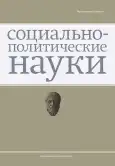Phubbing as a Socio-psychological Phenomenon of the Modern Society
- Authors: Yakovleva A.V.1, Konyukhovskiy P.V.1
-
Affiliations:
- Herzen State Pedagogical University of Russia
- Issue: Vol 12, No 6 (2022)
- Pages: 150-161
- Section: Articles
- URL: https://journal-vniispk.ru/2223-0092/article/view/147043
- DOI: https://doi.org/10.33693/2223-0092-2022-12-6-150-161
- ID: 147043
Cite item
Abstract
Full Text
##article.viewOnOriginalSite##About the authors
Anna V. Yakovleva
Herzen State Pedagogical University of Russia
Email: yeif@mail.ru
Dr. Sci. (Econ.), Professor; associate professor St. Petersburg, Russian Federation
Pavel V. Konyukhovskiy
Herzen State Pedagogical University of Russia
Email: konyukhovskiy@herzen.spb.ru
Dr. Sci. (Econ.), Professor St. Petersburg, Russian Federation
References
- Valiullina E.V. Interactive orientation of personality. Bulletin of Social and Humanitarian Sciences. 2020. Vol. 1. No. 3. Pp. 57-60. (In Rus.)
- Grigoriev N.Yu., Chvyakin V.A. Predictors of phubbing in the structure of social communications. Humanities Professional of the South of Russia. 2021. No. 3 (49). Pp. 90-101. (In Rus.)
- Egorova M.S., Sitnikova M.A., Parshikova O.V. Adaptation of the short questionnaire of the dark triad. Psychological Research. 2015. Vol. 8. No. 43. (In Rus.) URL: http://psystudy.ru/index.php/num/2015v8n43/1181-egorova43.html (data of accesses: 20.02.2022).
- Ivanova I.V., Biryukova N.V. Guidelines for educational psychologists concerning the diagnosis of computer addiction in children and adolescents. URL: https://сккимры.рф/wp-content/uploads/2020/02/mrpp2.pdf (data of accesses: 20.02.2022).
- Maksimenko A.A., Deineka O.S., Dukhanina L.N., Saporovskaya M.V. Phubbing: pecularities of youth addictive behavior. Public Opinion Monitoring: Economic and Social Changes. 2021. No. 4. (In Rus.) URL: https://doi.org/10.14515/monitoring.2021.4.1822 (data of accesses: 20.04.2022).
- Mamina R.I. Etiquette and its dimensions in the information society. Information Society: Education, Science, Culture and Technologies of the Future. 2018. Vol. 2. Pp. 204-216. (In Rus.)
- Minbaleev A.V. The role of media education in shaping the information and legal culture of modern youth. Media Education. 2007. No. 1. Pp. 12-16. (In Rus.)
- Musalimova R.S., Akhmadeev R.R. Brief description of test methods for evaluating Internet addictive behavior. Bulletin of the Bryansk State University. 2015. No. 3. Pp. 32-34. (In Rus.)
- Questionnaire for the method “Scale of emotional response” by A. Megrabyan and N. Epstein. URL: https://www.psychologos.ru/articles/view/oprosnik-metodiki-shkala-emocionalnogo-otklika-a.-megrabyana-i-n.-epshteyna (data of accesses: 20.02.2022).
- Price C. How to break up with your phone. Transl. from Enslich by G. Trgemeckiy. Мoscow: Mann, Ivanov and Ferber. 2020. Pp. 153, 230.
- Fetiskin N.P., Kozlov V.V., Manuilov G.M. Socio-psychological diagnostics of development of personality and small groups. Moscow: Publishing House of the Institute of Psychotherapy. 2002. Pp. 59-63.
- Chvyakin V.A., Grigoriev N.Yu. Phubbing in the structure of social communications: a sociological analysis of the phenomenon. Humanities Professional of the South of Russia. 2020. Vol. 9 (45). No. 5. Pp. 150-161. (In Rus.)
- Shipunov A.B., Baldin E.M. Data analysis with R. URL: https://sociology.knu.ua/sites/default/files/course/materials/r1.pdf (data of accesses: 08.04.2022).
- Yakovleva A.V. Problems of legal regulation of information security in the context of the development of the digital economy. Saratov: Amirit, 2021. 272 p.
- Chen S.-H., Weng L.J., Su Y.J. et al. Development of chinese Internet addiction scale and its psychometric study // Chinese Journal of Psychology. 2003. № 45 (3). Pp. 279-294.
- Chotpitayasunondh V., Douglas K.M. How “phubbing” becomes the norm: The antecedents and consequences of snubbing via smartphone // Computers in Human Behavior. 2016. No. 63. Рp. 9-18.
- Chotpitayasunondh V., Douglas K.M. Measuring phone snubbing behavior: Development and validation of the Generic Scale of Phubbing (GSP) and the Generic Scale of Being Phubbed (GSBP) // Computers in Human Behavior. 2018. Vol. 88. Pp. 5-17.
- De Buck A., Pauwels L.J.R., Hardyns W., Ponnet K. Testing measurement invariance of the dark triad dirty dozen in a belgian adult sample // Psychologica Belgica. 2021. № 61 (1). Рp. 377-390.
- Khare S., Qasim S.H. Phubbing - a growing trend among youth // International Journal of Applied Social Science. 2019. Vol. 6 (4). Pp. 812-816.
- Medina López J.P. El fenómeno social Phubbbing y las relaciones interpersonales en jóvenes universitarios de la Facultad de Comunicación Social de la jornada nocturna. URL: http://repositorio.utp.edu.co/dspace/handle/11059/7857 (дата обращения: 26.07. 2021).
- Miller-Ott A.E., Kelly L. A politeness theory analysis of cell-phone usage in the presence of friends // Communication Studies. 2017. No. 68 (2). Pp. 190-207.
- Miller-Ott A.E., Kelly L. The presence of cell phones in romantic partner face-to-face interactions: an expectancy violation theory approach // Southern Communication Journal. 2015. Vol. 80. Issue 4. Pp. 253-270.
- Ugura N.G., Koc Т. Time for Digital Detox: Misuse of mobile technology and phubbing // World Conference on Technology, Innovation and Entrepreneurship. Procedia - Social and Behavioral Sciences. 2015. № 195. Рp. 1022-1031.
Supplementary files








